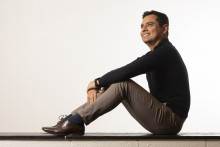In fact, the symposium is organized because of Cabrita’s defense that also carries the theme ‘Active and Pleasant Ageing Supported by Technology’. Why is it important to zero in on this topic? ‘Being physically active is the core of living independently in an older age, but older adults are often not active enough. Which is why I wanted to explore how we could promote their physical activity using technology,’ explains the soon-to-be UT graduate.
Symposium: Active and Healthy Ageing supported by Technology
The symposium is taking place this Friday, on the 10th of November, in the DesignLab. This open event will include speakers from various institutes and disciplines and cover topics such as sensing, data mining, psychology and human media interaction. More information can be found here.
Positive emotions
Initially, Cabrita planned to design a specific intervention for older adults within her PhD research, but soon she realized she first needed to understand their daily life and behavior. ‘As I mentioned, older people are often not active enough. And when I say physical activity, I don’t mean only exercise, but any form of movement, including gardening, for example,’ clarifies the researcher, who therefore looked into everyday activities of older adults, identifying how much pleasure these activities bring them.
‘I definitely wanted to incorporate positive psychology, focus on positive emotions,’ says Miriam Cabrita. ‘Because if you enjoy an activity, you repeat it, and because positive emotions also affect our physical health. Moreover, ageing is often associated with negativity.’
Do elderly people want technology?
Although psychology played an important role in the research, Miriam Cabrita isn’t a social scientist herself. That is where the use of technology comes in. ‘I feel so lucky to live in a time when we have all these gadgets. I’m a biomedical engineer, so I love technology. Furthermore, we can use this technology to measure behavior, understand it and then help to change it,’ smiles Cabrita, who has done her PhD research at the Biomedical Signals and Systems group and worked at Roessingh Research and Development.

Photo of Miriam Cabrita
However, do elderly people even want to use technology? After all, some might say they are not exactly famous for their technical skills. ‘Our test group was happy with the use of technology and I don’t think it is difficult for older adults to use it,’ says Cabrita ‘It is a large group and they are willing to learn. Maybe you just need to spend a bit more time explaining everything to them.’
‘We should never forget empathy’
Overall, Miriam Cabrita believes that using technology to support healthy and pleasant ageing is definitely the way forward, but there are things we should keep in mind: ‘Older adults want to use technology, but under certain conditions. We should never forget empathy. People want to feel like they matter, not like they are only following orders of a machine – and that is what the older adults fear. Technology should support human contact, not replace it.’







